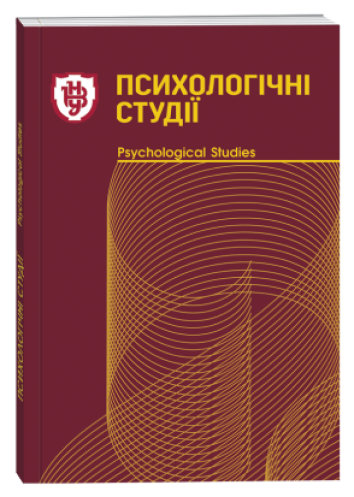FEATURES OF THE RELATIONSHIP OF PERFECTIONISM AND PERSONALITY SELF-ACTUALIZATION
DOI:
https://doi.org/10.32782/psych.studies/2024.1.24Keywords:
self-actualization, perfectionism, narcissism, personalityAbstract
Based on an empirical study of the relationship between self-actualization and perfectionism in personality formation, the interaction between the level of perfectionism and the level of self-actualization was revealed. It has been studied that the achievement of self-actualization is facilitated by self-oriented perfectionism, which, in turn, is the basis of motivation for internal changes, development and personality formation. At the same time, a high level of social-prescriptive perfectionism prevents the achievement of self-actualization, as it provokes a person to unquestioningly follow the social norms and requirements of other people, and also greatly limits the development of the personality. For the study of self-actualization and perfectionism, appropriate psychodiagnostic methods were selected: the self-actualization research test (SAT, SAMOAL questionnaire) and the Hewitt- Flett multidimensional scale of perfectionism. The method "Determining the level of self-actualization of the individual" (SAMOAL questionnaire) is formed on the basis of the features of selfactualization of the subject in the post-industrial society. A significant difference, compared to the previous version, is the specificity of the types of scales and the formation of diagnostic questions. The "Multidimensional Perfectionism Scale" (MPS-H) method (P. Hewitt and G. Flett) makes it possible to determine the specifics of perfectionism as a versatile phenomenon. According to the results of the research, the relationship between self-actualization and perfectionism of the individual was revealed, which was confirmed by a number of negative correlations between the mentioned phenomena. It has been studied that a high level of general perfectionism prevents achieving a high level of self-actualization. In the process of research, negative relationships were also found between the level of general perfectionism and certain components of self-actualization (behavior lability, spontaneity, self-acceptance, self-respect, contact, etc.). In particular, personality-oriented perfectionism is negatively correlated with the scale of support, behavioral lability, and self-acceptance. There are significant negative correlations between the level of social-command perfectionism and the lability of behavior and spontaneity.
References
Братаніч Б.В., Ільченко І.Г. Самоактуалізація особистості та освіта. Філософські проблеми освіти . 2021. № 2. С. 13–20.
Лоза О. О. Особливості перфекціонізму як особистісної риси державних службовців : дис. канд. псих. наук : 19.00.01 «Загальна психологія; історія психології» / Лоза О. О. Київ, 2015. 205 с.
Большакова А.М. Особистісна реалізованість людини в онтогенезі: автореф. дис. ... д-ра психол. наук : 19.00.07. Класич. приват. ун-т. Запоріжжя, 2011. 36 с.
Павлова В. С. Теоретичний аналіз типологій перфекціонізму. Актуальні проблеми психології : зб. наук. пр. Ін-ту психології ім. Г. С. Костюка НАПН України / Ін-т психології ім. Г. С. Костюка НАПН України. Київ : ЛАДО, 2013. Т. 1 : Організаційна психологія. Економічна психологія. Соціальна психологія, Вип. 39. С. 53–57.
Parker W. D. Perfectionism and the gifted. Roepel Review. 1985. V. 17. № 3. P. 173–176.
Карпенко Є.В. Перфекціонізм як джерело невротизації особистості. Науковий вісник Херсонського державного університету. Серія : Психологічні науки. Вип. 1. Т. 1. Херсон : Херсонський держ. ун-т, 2016. С. 30–37.
Скрипченко О., Роменська Л., Огоднійчук З., Зелінська Т., Загальна психологія .К.: АПН, 1999.
Чепурна Г. Л. Особливості прояву соціально приписаного перфекціонізму молоді. Вісник Чернігівського національного педагогічного університету. Серія : Психологічні науки. 2015. №126. С. 171–175.
Кононенко О. Проблема онтогенезу перфекціонізму особистості в сучасних дослідженнях. Вісник ОНУ ім. І. І. Мечникова. Психологія. 2014. Т. 19. Вип. 2 (32). С. 171–177.
Грубі Т.В. Сімейні чинники, що впливають на розвиток перфекціонізму особистості. Київський науково-педагогічний вісник. 2016. № 7 (07). C. 43–50.







